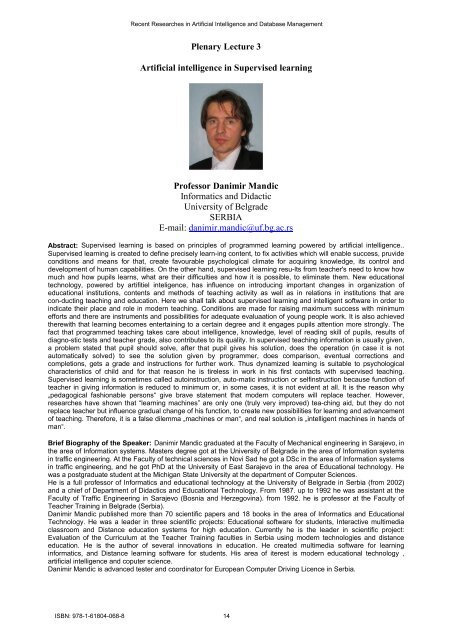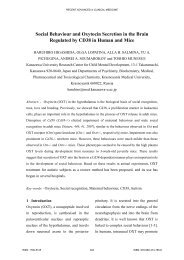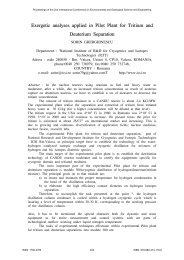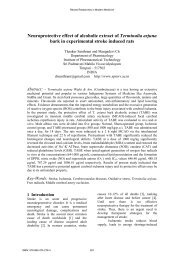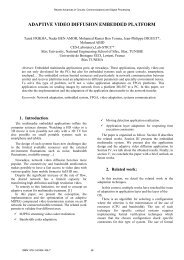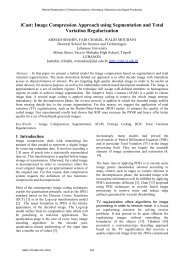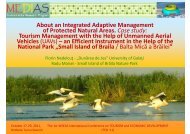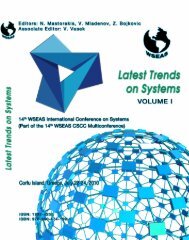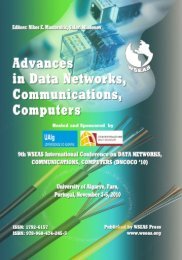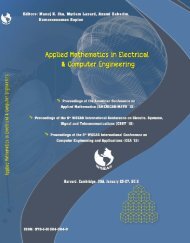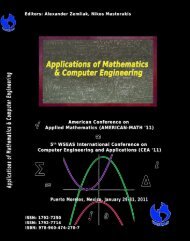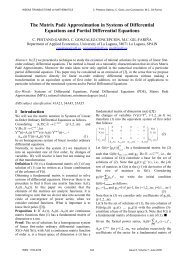(AIKED '12) Cambridge, UK February 22-24, 2012 - Wseas.us
(AIKED '12) Cambridge, UK February 22-24, 2012 - Wseas.us
(AIKED '12) Cambridge, UK February 22-24, 2012 - Wseas.us
Create successful ePaper yourself
Turn your PDF publications into a flip-book with our unique Google optimized e-Paper software.
Recent Researches in Artificial Intelligence and Database Management<br />
Plenary Lecture 3<br />
Artificial intelligence in Supervised learning<br />
Professor Danimir Mandic<br />
Informatics and Didactic<br />
University of Belgrade<br />
SERBIA<br />
E-mail: danimir.mandic@uf.bg.ac.rs<br />
Abstract: Supervised learning is based on principles of programmed learning powered by artificial intelligence..<br />
Supervised learning is created to define precisely learn-ing content, to fix activities which will enable success, pruvide<br />
conditions and means for that, create favourable psychological climate for acquiring knowledge, its control and<br />
development of human capabilities. On the other hand, supervised learning resu-lts from teacher's need to know how<br />
much and how pupils learns, what are their difficulties and how it is possible, to eliminate them. New educational<br />
technology, powered by artifitiel inteligence, has influence on introducing important changes in organization of<br />
educational institutions, contents and methods of teaching activity as well as in relations in institutions that are<br />
con-ducting teaching and education. Here we shall talk about supervised learning and intelligent software in order to<br />
indicate their place and role in modern teaching. Conditions are made for raising maximum success with minimum<br />
efforts and there are instruments and possibilities for adequate evaluaation of young people work. It is also achieved<br />
therewith that learning becomes entertaining to a certain degree and it engages pupils attention more strongly. The<br />
fact that programmed teaching takes care about intelligence, knowledge, level of reading skill of pupils, results of<br />
diagno-stic tests and teacher grade, also contributes to its quality. In supervised teaching information is <strong>us</strong>ually given,<br />
a problem stated that pupil should solve, after that pupil gives his solution, does the operation (in case it is not<br />
automatically solved) to see the solution given by programmer, does comparison, eventual corrections and<br />
completions, gets a grade and instructions for further work. Th<strong>us</strong> dynamized learning is suitable to psychological<br />
characteristics of child and for that reason he is tireless in work in his first contacts with supervised teaching.<br />
Supervised learning is sometimes called autoinstruction, auto-matic instruction or selfinstruction beca<strong>us</strong>e function of<br />
teacher in giving information is reduced to minimum or, in some cases, it is not evident at all. It is the reason why<br />
„pedagogical fashionable persons“ give brave statement that modern computers will replace teacher. However,<br />
researches have shown that “learning machines” are only one (truly very improved) tea-ching aid, but they do not<br />
replace teacher but influence gradual change of his function, to create new possibilities for learning and advancement<br />
of teaching. Therefore, it is a false dilemma „machines or man“, and real solution is „intelligent machines in hands of<br />
man“.<br />
Brief Biography of the Speaker: Danimir Mandic graduated at the Faculty of Mechanical engineering in Sarajevo, in<br />
the area of Information systems. Masters degree got at the University of Belgrade in the area of Information systems<br />
in traffic engineering. At the Faculty of technical sciences in Novi Sad he got a DSc in the area of Information systems<br />
in traffic engineering, and he got PhD at the University of East Sarajevo in the area of Educational technology. He<br />
was a postgraduate student at the Michigan State University at the department of Computer Sciences.<br />
He is a full professor of Informatics and educational technology at the University of Belgrade in Serbia (from 2002)<br />
and a chief of Department of Didactics and Educational Technology. From 1987. up to 1992 he was assistant at the<br />
Faculty of Traffic Engineering in Sarajevo (Bosnia and Herzegovina). from 1992. he is professor at the Faculty of<br />
Teacher Training in Belgrade (Serbia).<br />
Danimir Mandic published more than 70 scientific papers and 18 books in the area of Informatics and Educational<br />
Technology. He was a leader in three scientific projects: Educational software for students, Interactive multimedia<br />
classroom and Distance education systems for high education. Currently he is the leader in scientific project:<br />
Evaluation of the Curriculum at the Teacher Training faculties in Serbia <strong>us</strong>ing modern technologies and distance<br />
education. He is the author of several innovations in education. He created multimedia software for learning<br />
informatics, and Distance learning software for students. His area of iterest is modern educational technology ,<br />
artificial intelligence and coputer science.<br />
Danimir Mandic is advanced tester and coordinator for European Computer Driving Licence in Serbia.<br />
ISBN: 978-1-61804-068-8 14


